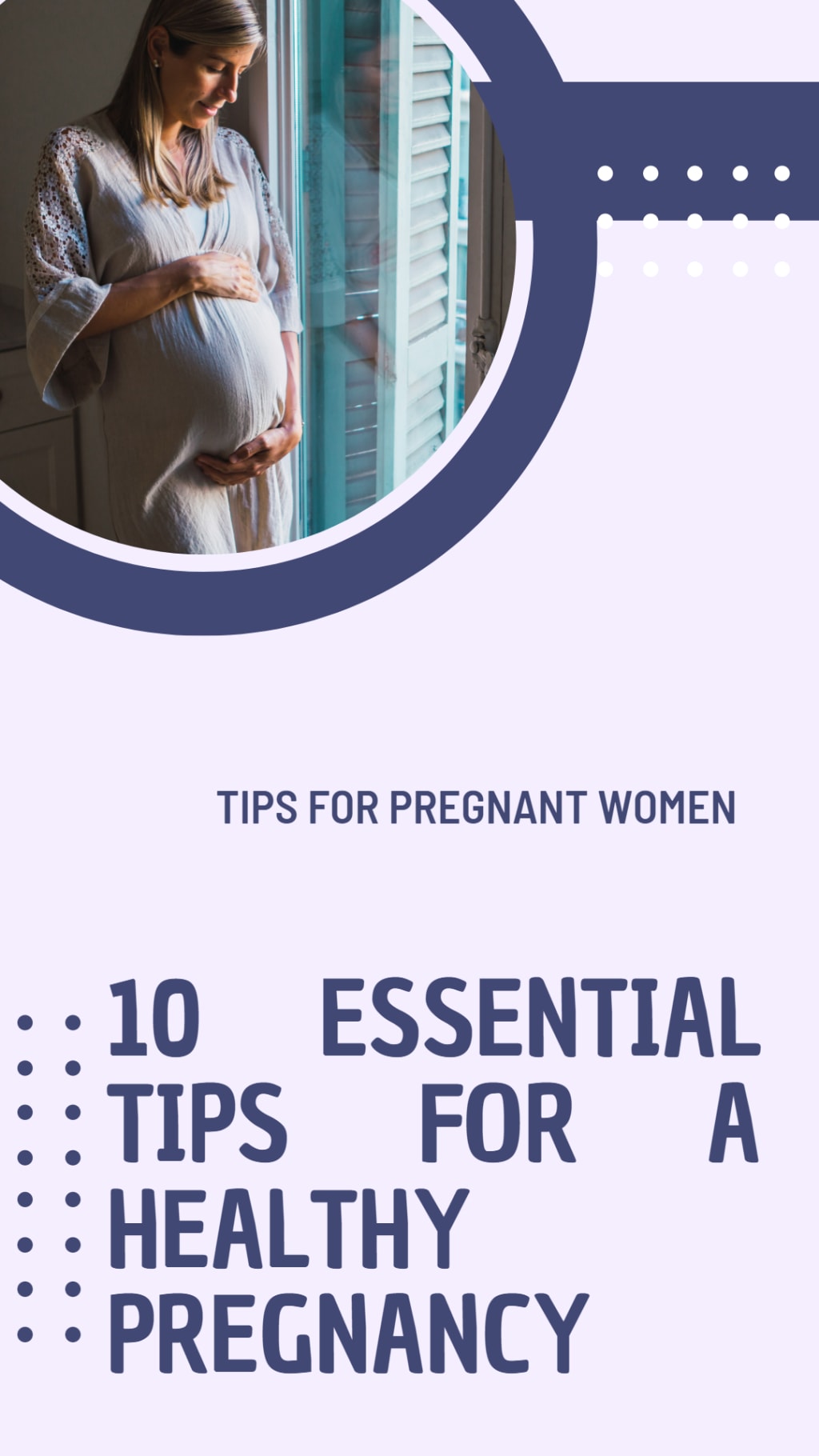10 Essential Tips for a Healthy Pregnancy
Great choice! Here are 10 essential tips for a healthy pregnancy that can help expectant mothers have a smooth and safe journey:

1. Get regular prenatal check-ups:
Regular prenatal visits can help ensure the health and well-being of both the mother and baby throughout pregnancy.
Regular prenatal check-ups are essential for a healthy pregnancy. These visits to your healthcare provider help monitor your health and the health of your growing baby. During these check-ups, your healthcare provider will measure your blood pressure, check your weight, and monitor the baby's growth and development.

They may also perform routine tests to check for any potential issues or complications, such as gestational diabetes or preeclampsia. Attending these check-ups on a regular basis can help detect any potential problems early on and allow for prompt treatment. It's important to keep up with your prenatal check-ups, even if you're feeling well, to ensure the best possible outcome for you and your baby.
2. Eat a healthy and balanced diet:
A nutritious diet with plenty of fruits, vegetables, whole grains, lean proteins, and healthy fats can help support fetal growth and development.
Eating a healthy and balanced diet is crucial for a healthy pregnancy. Your body needs extra nutrients during pregnancy to support the growth and development of your baby. A well-balanced diet should include plenty of fruits, vegetables, whole grains, lean proteins, and healthy fats. It's important to avoid foods that are high in saturated and trans fats, added sugars, and sodium. Eating a variety of foods can help ensure that you're getting all the nutrients you and your baby need.

In addition to a healthy and balanced diet, pregnant women should also take a prenatal vitamin to ensure that they're getting enough vitamins and minerals, such as folic acid, iron, and calcium. It's also important to stay hydrated by drinking plenty of water, as dehydration can lead to complications such as preterm labor and low amniotic fluid levels.
If you have any dietary restrictions or concerns about your diet during pregnancy, it's important to speak with your healthcare provider or a registered dietitian for guidance.
3. Stay active:
Regular exercise during pregnancy can help manage weight, reduce stress, and prepare the body for labor and delivery.
Staying active during pregnancy is important for both the mother and baby. Regular exercise can help reduce the risk of complications such as gestational diabetes and preeclampsia, improve mood, and promote better sleep. It can also help prepare the body for labor and delivery.
However, it's important to consult with your healthcare provider before starting or continuing any exercise routine during pregnancy. Depending on your individual circumstances, some exercises may not be safe or recommended. In general, low-impact exercises such as walking, swimming, and prenatal yoga are good options for most pregnant women.

It's important to listen to your body and make modifications as needed. Avoid exercises that involve lying on your back or require a lot of jumping, twisting, or bouncing. Be sure to wear comfortable, supportive shoes and drink plenty of water during and after exercise.
If you experience any pain, discomfort, or other concerning symptoms during exercise, stop and consult with your healthcare provider.
4. Stay hydrated:
Drinking plenty of water can help prevent constipation, regulate body temperature, and support the development of the placenta.
Staying hydrated during pregnancy is essential for both the mother and baby. Water is important for many bodily functions, including regulating body temperature, transporting nutrients, and removing waste products. Pregnant women need to drink more water than usual to support the increased blood volume, amniotic fluid, and other needs of the developing fetus.

Dehydration during pregnancy can lead to complications such as preterm labor and low amniotic fluid levels. It can also cause constipation and urinary tract infections, which are common in pregnant women.
To stay hydrated during pregnancy, aim to drink at least eight to ten glasses of water per day, and more if you're exercising or in a hot environment. You can also get fluids from other sources, such as fruit and vegetable juices, milk, and herbal teas.
If you experience symptoms such as dark urine, dry mouth, dizziness, or fatigue, it may be a sign that you need to drink more water. Be sure to consult with your healthcare provider if you have any concerns about hydration during pregnancy.
5. Get enough rest:
Getting enough sleep and rest is crucial during pregnancy to support both the mother's and baby's health.
Getting enough rest is important during pregnancy to support the health and well-being of both the mother and baby. Pregnancy can be physically and emotionally demanding, and sleep is essential for the body to repair and recharge.
During pregnancy, it's recommended that women get at least 7-8 hours of sleep per night. However, it's not uncommon for pregnant women to experience sleep disturbances due to physical discomfort, hormonal changes, or anxiety.

To improve sleep during pregnancy, it can be helpful to establish a bedtime routine and create a sleep-conducive environment. This may include winding down with relaxing activities such as reading or taking a warm bath, keeping the bedroom cool and dark, and using pillows to support the body.
It's also important to prioritize rest during the day. Napping or taking breaks as needed can help combat fatigue and provide a boost of energy.
If you experience persistent sleep disturbances or excessive daytime sleepiness, it's important to consult with your healthcare provider to rule out any underlying medical conditions.
6. Manage stress:

High levels of stress during pregnancy can lead to negative outcomes for both the mother and baby. Finding ways to manage stress, such as meditation, prenatal yoga, or talking to a therapist, can help.
Managing stress is important during pregnancy for both the mother and baby. Pregnancy can be a time of significant physical and emotional changes, and stress can have negative effects on both the mother and baby.
Chronic stress during pregnancy has been associated with an increased risk of preterm labor, low birth weight, and other complications. It can also affect the baby's brain development and emotional well-being later in life.
To manage stress during pregnancy, it's important to identify the sources of stress and develop strategies to cope with them. This may include relaxation techniques such as deep breathing, meditation, or prenatal yoga. It may also include making time for activities that you enjoy and that help you feel relaxed and refreshed, such as reading, listening to music, or spending time in nature.
Support from family and friends can also be helpful during pregnancy, as can professionally counselling or therapy.
It's important to talk to your healthcare provider if you are experiencing persistent stress or anxiety during pregnancy. They may be able to provide additional resources or support to help manage stress and promote a healthy pregnancy.
7. Take prenatal vitamins:

Prenatal vitamins can help fill in any nutritional gaps in the mother's diet and ensure that the baby gets the necessary vitamins and minerals for healthy development.
Taking prenatal vitamins is important during pregnancy to ensure that both the mother and baby get the nutrients they need for optimal health. Prenatal vitamins are specifically formulated to provide higher amounts of certain vitamins and minerals that are essential for a healthy pregnancy, such as folic acid, iron, and calcium.
Folic acid is particularly important in the first trimester of pregnancy, as it helps prevent neural tube defects in the developing fetus. Iron is important for the production of haemoglobin, which carries oxygen in the blood. Calcium is important for the development of the baby's bones and teeth.
It's important to start taking prenatal vitamins before conception, if possible, and to continue taking them throughout the pregnancy. Your healthcare provider may recommend a specific brand or type of prenatal vitamin, based on your individual needs and health status.
It's also important to avoid taking too much of certain vitamins and minerals during pregnancy, as this can be harmful to the developing baby. Be sure to follow your healthcare provider's recommendations for dosage and timing of prenatal vitamins.
8. Avoid harmful substances:
Avoiding tobacco, alcohol, and drugs during pregnancy is essential to reduce the risk of negative outcomes for both the mother and baby.
Avoiding harmful substances during pregnancy is important to ensure the health and well-being of both the mother and baby. Exposure to certain substances can increase the risk of birth defects, developmental delays, and other complications.

Some harmful substances to avoid during pregnancy include:
• Alcohol: Drinking alcohol during pregnancy can increase the risk of fetal alcohol spectrum disorders, which can cause lifelong physical, behavioural, and intellectual disabilities in the baby.
• Tobacco: Smoking during pregnancy can increase the risk of premature birth, low birth weight, and other complications. Exposure to second-hand smoke can also be harmful to the developing fetus.
• Illicit drugs: Using illicit drugs during pregnancy can increase the risk of preterm labor, low birth weight, and other complications. It can also cause long-term developmental problems for the baby.
• Certain medications: Some medications, including certain antibiotics, anticonvulsants, and acne treatments, can be harmful to the developing fetus. It's important to consult with your healthcare provider before taking any medication during pregnancy.
It's also important to avoid exposure to environmental toxins and pollutants, such as lead, mercury, and certain chemicals. Be sure to follow safe practices for handling and preparing food, and to wash fruits and vegetables thoroughly to reduce the risk of exposure to harmful bacteria.
If you have concerns about exposure to harmful substances during pregnancy, be sure to consult with your healthcare provider for guidance and support.
9. Educate yourself:
Reading books, attending classes, and speaking with healthcare providers can help mothers prepare for childbirth and learn how to care for their new-born.
Educating yourself about pregnancy and childbirth can help you feel more prepared and confident as you navigate this new stage of life. There is a lot of information available about pregnancy and childbirth, and it can be overwhelming to try to absorb it all at once.
Some ways to educate yourself about pregnancy and childbirth include:
• Reading books and articles about pregnancy and childbirth
• Attending prenatal classes or childbirth education classes
• Talking to your healthcare provider and asking questions
• Joining online or in-person support groups for pregnant women
It's important to be aware of the signs and symptoms of potential complications during pregnancy, such as preterm labor, preeclampsia, and gestational diabetes. Knowing what to expect during labor and delivery can also help reduce anxiety and fear.
Educating yourself about breastfeeding and new-born care can also help you feel more prepared for the postpartum period.
Remember that every pregnancy is unique, and what works for one person may not work for another. Be sure to consult with your healthcare provider for personalized advice and guidance throughout your pregnancy.
10. Connect with others:
Connecting with other expecting mothers, joining a support group, or speaking with a healthcare provider can help mothers feel supported and less alone during their pregnancy journey.
Connecting with others during pregnancy can help you feel supported and reduce feelings of isolation or anxiety. Pregnancy can be an exciting but also challenging time, and having a network of people to turn to for advice and support can be helpful.
Some ways to connect with others during pregnancy include:
• Joining a prenatal yoga or fitness class
• Attending a support group for pregnant women or new parents
• Connecting with other pregnant women or new parents through online forums or social media groups
• Talking to family members or friends who have been through pregnancy and childbirth
It's important to surround yourself with people who will offer positive support and encouragement, and who will respect your choices and decisions as a parent. It can also be helpful to connect with healthcare providers, such as a midwife or doula, who can provide additional support and guidance throughout your pregnancy and childbirth experience.
Remember that you are not alone, and that many others have gone through the same experiences and challenges that you may be facing. By connecting with others, you can build a supportive network that can help you feel more confident and empowered throughout your pregnancy and beyond.
About the Creator
Enjoyed the story? Support the Creator.
Subscribe for free to receive all their stories in your feed. You could also pledge your support or give them a one-off tip, letting them know you appreciate their work.





Comments
There are no comments for this story
Be the first to respond and start the conversation.